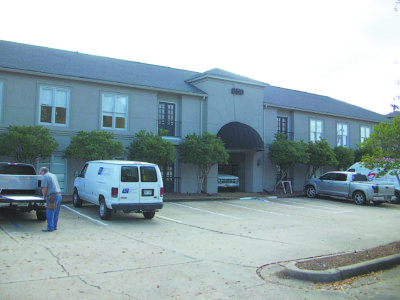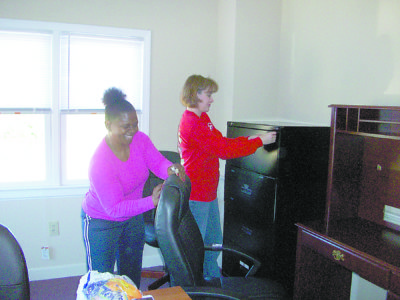By Maureen Smith
JACKSON — Every nine seconds a woman in the United States is assaulted or beaten. Every minute, 20 people suffer from domestic violence. October is Domestic Violence Awareness Month, but “this is not a one-month issue. This is an issue always,” said Betsy Smith, a caseworker for the Catholic Charities Domestic Violence Program.
The program, which includes an emergency shelter, group support, case management, some legal counseling, child care and, in some cases, temporary housing, is moving and expanding this year. The old facility was in need of repair so they moved into temporary quarters until they could find a new home.
The staff hopes to be in a new building by the start of the new year. “It has room for more families, the daycare, the cafeteria and is more centrally located,” said Arteria Puckett, program director. The program serves nine counties: Copiah, Hinds, Madison, Rankin, Issaquena, Sharkey, Simpson, Warren and Yazoo.
Puckett, Smith and Sarah Bradley offer a program they hope will take women and their children “from victim to survivor to thriver,” said Puckett.
It all starts when a woman contacts the shelter. She may be ready to leave or she may need to make a plan. The staff can help in a couple of different ways. They are open 24-hours a day so they can offer an immediate safe place for a woman and her children to take shelter.
If a woman just wants resources, the staff can help her write an individualized safety plan. The form takes her through questions such as “if I decide to leave I will …,” and “I will use (Blank) as my code word for my children and friends so they can call for help.” The plan lists documents a woman may want to locate and remove so she will have them once she makes her escape and helps her think through the concrete steps of getting out.
Staff members can also invite a woman to one of the group support sessions to meet survivors and get the support she needs to take next steps.
One of the concepts the staff tries to impress upon a woman is that violence often escalates so the sooner she can leave the situation, the safer she and her children will be. They all remember a case in which a woman returned to her partner only to be beaten to death in her own home.
Once a woman and her children are at the shelter, Puckett, Smith and Bradley help her start to build a new life. Bradley can work as a court advocate, helping a woman obtain a temporary restraining order against her abuser. The center provides daycare for the children so the women can find jobs or pursue their education. Once a week, the center offers support groups with a variety of speakers, from nutritionists to job coaches who offer tips on dressing for job interviews.
The staff wants to help the women develop life skills so they don’t leave and go back to their old lives, but leave with new – violence free – lives. “We did vision boards one night where we asked the ladies to create a vision for what they wanted their lives to be like,” said Smith.
Women can stay in the shelter for up to 45 days. If a woman is making progress, but still needs some support, they move into transitional communal housing. There, the women work and learn how to save money so they can move into a permanent situation.
Misconceptions abound when it comes to domestic violence. Puckett explained that it takes many forms, from the physical violence many people think of, to control, emotional manipulation to verbal or sexual abuse. “We heard about one case in which the man became so controlling, he followed her into the bathroom,” she said.
Puckett said many people think domestic violence is rare, but it crosses all racial, socioeconomic, geographic and educational boundaries. Men can be the victims of domestic violence as well as women.
One of the prevailing myths is that battered women can leave if they want. Puckett and Smith both said partners tend to become more controlling a suspicious as a relationship develops. He may take away her transportation, cut off her access to money, friends and family and isolate his victim so she feels she has no way to get out. “Many of our consumers come from out of state, so they have no support here. They end up depending on that guy who is abusing them,” said Puckett.
From a Catholic perspective, many women live with the myth that the church won’t let her leave an abuser. This is just not true. The U.S. Conference of Catholic Bishops (USCCB) issued a statement condemning domestic violence and outlining the church’s stand on the issue as it relates to marriage. “…we emphasize that no person is expected to stay in an abusive marriage. Some abused women believe that church teaching on the permanence of marriage requires them to stay in an abusive relationship. They may hesitate to seek a separation or divorce. They may fear that they cannot re-marry in the Church,” reads the statement. “Violence and abuse, not divorce, break up a marriage,” it continues.
The staff at the shelter wants everyone to know they are still available and will be throughout their move to the new location. Anyone in need of assistance can call the 24-hour crisis hotline at 800-799-SAFE (7233).
Recognize signs, call for help
The staff at the Catholic Charities Domestic Violence Shelter
offered these warning signs to help recognize abuse:
Does your partner humiliate you or put you down in front of friends or family members?
Is your partner extremely possessive or jealous?
Do your partner need to know where you are at all times, often checking on you?
Is your view of your relationship different from that of your partner?
Are you starting to believe you are losing your mind because you are starting to believe what your partner says about you?
Do you do everything you can to try to make your partner happy, only to hear it’s all wrong?
Have you ever been afraid of your partners temper?
Have you ever not expressed your opinion of feelings because you are afraid of your partner’s reaction?
Do your partner act like the abusive behavior is nothing, blame you for it or tell you that it didn’t happen?
Has your partner ever threatened you with weapons of any sort?
Has your partner ever threatened suicide, especially if you leave?
If you are being abused, remember:
You are not to blame for being battered or mistreated
You are not the cause of your partner’s abusive behavior
You deserve to be treated with respect
You deserve a safe and happy life
Your children deserve a safe and happy life
You are not alone. There are people waiting to help.
24-Hour Crisis Hotline: 800-799-7233 (SAFE)



